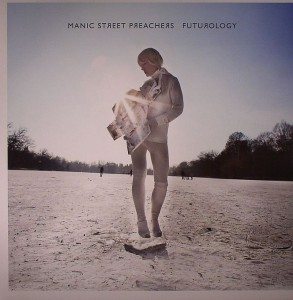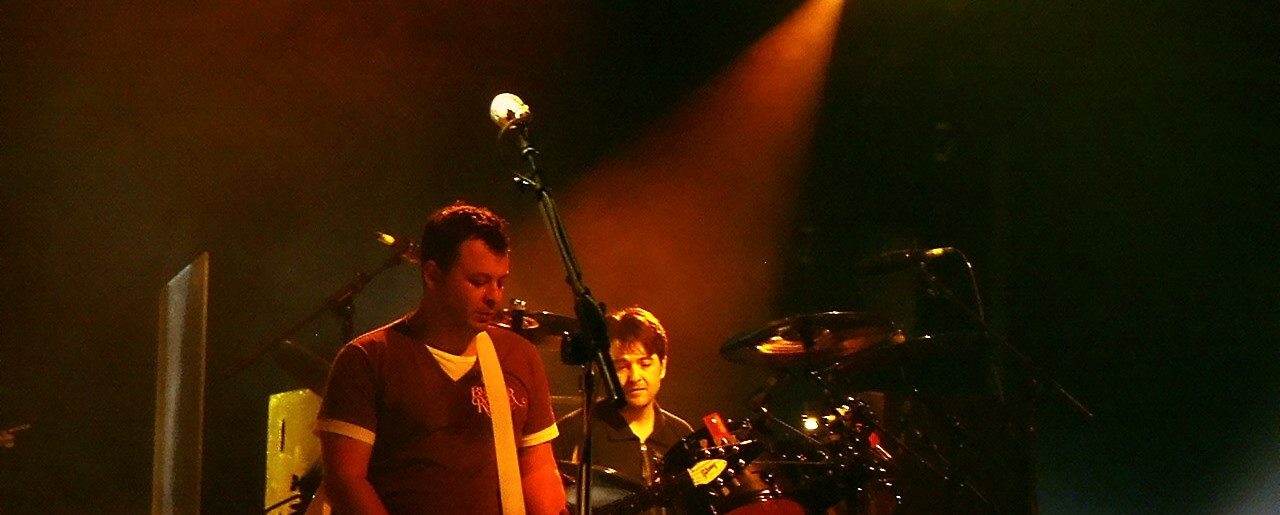Futurology
 Ten months since the acoustic introversion of Rewind the Film, the Manics return with an entirely different force. In what Nicky Wire dubs “Post-punk disco rock”; Futurology marks the band’s most ambitious record in two decades.
Ten months since the acoustic introversion of Rewind the Film, the Manics return with an entirely different force. In what Nicky Wire dubs “Post-punk disco rock”; Futurology marks the band’s most ambitious record in two decades.
Few bands endure like the Manic Street Preachers. From chart topping success to personal tragedy – reaching their 12th studio album is an achievement that many bands would celebrate. It’s even more surprising, however, that words like ‘refreshing’ and ‘bold’ spring to mind upon listening to their latest effort.
Futurology marks a new stylistic direction for the Manic Street Preachers. Whilst Nicky Wire’s leftist themes and James Bradfield’s vocals are unmistakable; their Welsh anthemic rock adopts a darker, European sound. From vintage synth pads to a more flamboyant production, the Manics explore new ground in this record – a remarkable 22 years since their debut Generation Terrorists. In fact, for a band whose last album was entirely acoustic, the Manics achieve something special with Futurology. This is not a risqué concept album, nor does it swap guitars for keyboards entirely. It is a confident and focused blend of what they do best – with something entirely different.
The record itself can be seen as a love letter to the European music of the 1980s. Recorded in the same studio as Depeche Mode’s Construction Time Again and David Bowie’s Heroes; Futurology follows a similar aesthetic in its ambitious production. Lyrically, it speaks of European escapism and romance, with two songs recorded in German and French respectively. Certainly, this is a new direction for the Welsh veterans. This isn’t a Send Away The Tigers (2007) return to chart-storming form, but an artistic shift that is not expected from a band of this age. If Bowie’s Berlin Trilogy marked his departure from popular music, then Futurology follows a similar ethos.
Futurology is built on the foundation of their darkest work – but offers a progressive step forward
Futurology also commemorates 20 years since the bands’ most acclaimed work, The Holy Bible. Although Richey Edwards’s nihilistic punk seems distant in this record, its influence is undeniable.Wire describes the new record as The Bible’s ‘bedfellow’, an apt comment given its departure from their more radio-friendly releases. However, Futurology should not be confused as a tribute or a sequel. It’s more of an evolution. The Manics have no desire to reiterate that chapter of their career. The angst of that period would be crass given their maturity into middle age. Futurology is built on the foundation of their darkest work – but offers a progressive step forward.
For example, ‘Let’s Go to War’ combines a haunting ‘Bible’–esque riff with a more contemporary beat. This track, and much of the album, establishes a wonderful blend of old and new for the Manics. ‘Sex, Love, Power and Money’ even offers a direct nod to Bowie with the line “We could have been heroes… but failure’s more fun.” But despite obvious influence and homage, this record remains strikingly confident in its own sound. The punchy guitar chords and chantable-lyrics are still there amongst the extravagant production. This is unmistakably a Manics record. Likewise, ’The Next Jet To Moscow’ offers a similar familiarity and does not feel out of place within their existing discography. ‘Dreaming a City (Hugheskova), however, is an entirely different effort – an instrumental track of big guitars, synths and Vangelian beats. Think Brian Eno meets Blade Runner. This doesn’t anything like the Manics have ever done before – a remarkable feat given the length of their career.
The singles ‘Walk Me To The Bridge’ and ‘Europa Geht Durch Mich’ are also (naturally) strong, demonstrating the Manics’ impeccable grasp of hook and melody. That said, they might be slightly inaccessible to new fans. Only the Manics would write a line like “God builders, divine losers/Let’s salute eternalism”; record half the song in German and then release it as a promotional single. Nevertheless, that catchy intellectualism is why the Manics are so beloved, and it’s satisfying to see they have not mellowed with age.
Ultimately, Futurology is an impressive record; it’s exciting and succeeds at exactly what it attempts to do. This isn’t a failed concept album, or an experimental phase; but a proud step forward for a band who have beaten all the odds. For an act that could easily be retiring into greatest hits records by now, the Manic’s have proven an endurance that few British rock bands posses. As Wire sings on the title track, “we’ll be back some day // we never really went away”, indeed, the Manics are back – reinventing their intellectual post-punk, 28 years on.

Comments (1)